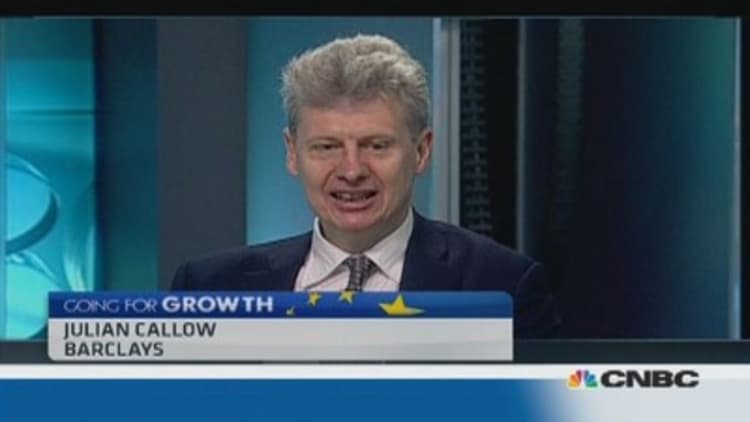The euro zone's economy slowed in the third quarter, sending a worrying signal to other global economies that demand from one of their biggest trading partners could fall back.
The annual gross domestic product of the 17-country group grew by just 0.1 percent in the third quarter of 2013, marking a slowdown from an expansion of 0.3 percent in the second quarter.
The latest figures from Europe's statistics agency Eurostat showed that growth in the 17-nation bloc had contracted 0.4 percent from this time last year. Analysts polled by Reuters had expected growth of 0.2 percent in the third quarter.
The latest data signals that the euro zone could be sliding back towards recession after it had pulled out of an 18-month stretch of negative growth -- and the longest contraction in continental Europe in over 40 years -- in the second quarter, with gross domestic product expanding by 0.3 percent from the first three months of the year.
"The bleak third-quarter GDP estimate shows just how fragile and hesitant the euro zone's recovery is - so much so that it's questionable whether current economic conditions even qualify as a recovery," Nicholas Spiro, head of Spiro Sovereign Strategy, told CNBC on Thursday.
"The deceleration is, psychologically speaking, a major setback for the euro zone."
The euro fell to $1.34365 versus the dollar after the data was released, from $1.3447 beforehand.
Earlier on Thursday, data showed that the euro zone's largest economy Germany expanded 0.3 percent in the third quarter - and the country's statistics office delivered a broadside to those in Brussels and Washington who criticized its budget surplus earlier this week.
Its near-neighbor France, reported disappointing GDP figures, also on Thursday, as concerns about reforms to its economy grow. In Italy, meanwhile - the third largest economy in the euro zone after France -- the economy contracted by 0.1 percent quarter on quarter, marking two and a quarter years of recession for the country.
(Read more: EU exec opens Germany probe)
The data not only augurs more struggles ahead for the single currency area but could impact growth in the U.S., China and U.K, the euro zone's three largest trading partners, according to the European Central Bank (ECB).

Central bank data showed that from 2008 to 2012, around 43 percent of the euro zone's imports came from non-European Union (EU) partners with 8.5 percent of imports from the U.S. and 12 percent from China.
Imports from the U.K., meanwhile, amounted to almost 10 percent,showing that any slowdown in economic growth in the euro area – with its knock-on effect on consumer demand – could affect the growth outlook of countries around the world that seem to be in recovery mode.
During the third quarter of 2013, GDP in the United States grew by 0.7 percent compared with the previous quarter (after a 0.6 percent expansion in the second quarter of 2013).
China too is keen to hold onto its growth rate which showed the economy had grown 7.8 percent from a year ago, after the country's Prime Minister Premier Li Keqiang said earlier this month that China needed economic growth of at least 7.2 percent in order to ensure adequate employment.
The euro zone was not alone to disappoint on the data front, although it did so with far less room for error than Japan which reported its economy grew at 1.9 percent in the third quarter, signalling a marked slowdown from 3.8 percent growth registered in the second quarter. Analysts remarked that the slowdown was probably "temporary," however.
It's not so certain the same can be said for the euro zone, analysts warned.
"A faltering euro zone economy has long been one of the risks to the global recovery. However domestic demand in the euro zone has been contracting for quite some time," Spiro told CNBC. "What's more worrying is the sharper slowdown in emerging markets, particularly in Asia and Latin America. However, for the small export-oriented central European countries, which rely heavily on demand in the euro zone, the deterioration in the eurozone economy is particularly bad news."
Howard Archer, the chief U.K. and European economist at IHS Global Insight, meanwhile, said that the data showed the region was "struggling to develop recovery momentum."
"Indeed," he said. "Euro zone growth slowed from 0.3 percent quarter-on-quarter in the second quarter, when it had been boosted by a rebound in construction activity in many countries from weather-related weakness in the first quarter."
IHS expected euro zone GDP to edge higher in the fourth quarter but warned the recovery would be gradual and "vulnerable in the face of still significant headwinds."
- Catherine Boyle contributed reporting to this story.
Follow Catherine on Twitter: @cboylecnbc and Holly: @HollyEllyatt


